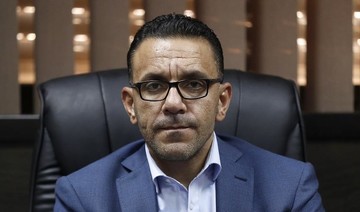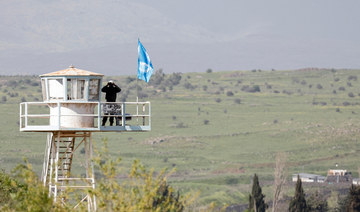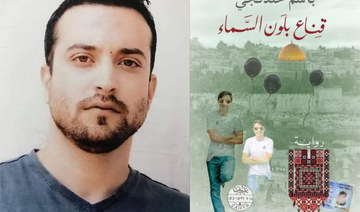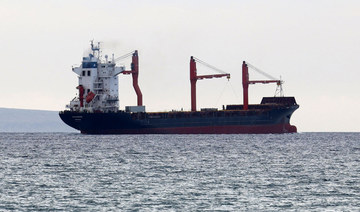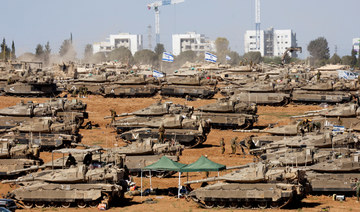JERUSALEM: President Donald Trump’s recognition of Jerusalem as Israel’s capital has set off an increasingly visible battle in the city’s eastern sector — with an emboldened Israel seeking to cement its control over the contested area and Palestinians pushing back to maintain their limited foothold.
In recent weeks, Israel has arrested dozens of Palestinian activists for alleged illegal political activity. It demolished Palestinian shops for failing to have permits, a court has cleared the way for settlers to move in to an Arab neighborhood and the city’s outgoing mayor is trying to close the east Jerusalem operations of the UN agency for Palestinian refugees.
The Palestinian Authority in the West Bank, in turn, has boosted efforts to protect its claim on Jerusalem, attempting to block east Jerusalem Palestinians from selling properties to Jews — a major taboo that it is largely powerless to prevent.
“The change in the US position on Jerusalem under Trump’s administration has unleashed the Israeli hands to increase and escalate its measures that aim to change the features of the city from a Palestinian city to an Israeli one,” said Walid Salem, a Palestinian analyst in Jerusalem. “The Palestinian Authority feels the heat and is stepping up measures to resist this Israeli policy.”
The conflicting claims to east Jerusalem lie at the heart of the Israeli-Palestinian conflict. Israel captured the area, home to the city’s most sensitive religious sites, in the 1967 Middle East war and annexed it, claiming the entire city as its capital. But the annexation is not internationally recognized, and the Palestinians seek east Jerusalem as the capital of a future state.
A year ago, Trump upended decades of American policy and recognized Jerusalem as Israel’s capital.
“We finally acknowledge the obvious: that Jerusalem is Israel’s capital,” Trump said at the time.
Several months later, he moved the US Embassy from Tel Aviv to Jerusalem, thrilling Israel and enraging the Palestinians.
Speaking at the embassy dedication ceremony in May, Netanyahu said: “We are in Jerusalem and we are here to stay.”
Although Trump has said his decision would not determine the city’s final borders, it has been seen by both Israel and the Palestinians as taking sides.
Israel’s hawkish government has been energized by the backing of its American ally in its quest to keep Jerusalem what it considers to be its eternal, undivided capital.
The Palestinians have for years accused Israel of taking steps to fortify its hold on the city, primarily by encircling Arab neighborhoods in east Jerusalem with Jewish settlements. These settlements, considered by Israel to be neighborhoods of its capital, are now home to over 200,000 Israelis.
Criticism from previous US administrations has often held Israel back in the past. With the reins removed, Israel has carried out a flurry of moves, often jostling with Palestinians along the way.
“Around 300, 000 Palestinian live in east Jerusalem,” said Adnan Husseini, the Palestinian minister of Jerusalem affairs. “They have always resisted the Israeli occupation measures in the city and they always will.”
In an unusual step, Israel arrested the top Palestinian official in Jerusalem this week along with over 30 Palestinian Jerusalemites, accusing them of the rarely enforced offense of serving in the Palestinian security forces in violation of previous agreements with Israel. Most were released on bail, but the governor, Adnan Ghaith, remains in custody.
The arrests appear to have been prompted by the detention of a Palestinian resident of east Jerusalem who allegedly sold property to Jews — a punishable offense under Palestinian law.
That detention was a bold move by the Palestinians because, also according to previous accords, they cannot arrest Jerusalem residents.
The Palestinians have also zeroed in on the Bedouin hamlet of Khan Al-Ahmar. Israel says the West Bank encampment, just outside of Jerusalem, was illegally built and is trying to uproot the village. A planned demolition was postponed following heavy European pressure, but it could still happen at any time.
Critics say the demolition is meant to make way for Israeli settlement homes, a step the Palestinians fear could cut off the West Bank from their hoped-for capital in east Jerusalem.
While Khan Al-Ahmar residents avoided eviction for now, others haven’t. After a lengthy legal battle, Israel’s Supreme Court this month rejected an appeal by residents of the Silwan neighborhood in east Jerusalem who claimed their land was illegally granted to a pro-settler group. The decision could lead to the evictions of hundreds of longtime Palestinian residents.
“A huge mechanism of displacement has been set in motion, allowing settlers and the government to work hand in hand,” said Yudith Oppenheimer, executive director of Ir Amim, an Israeli advocacy group that promotes coexistence in the city.
Israeli police demolished 18 stores in east Jerusalem last week in what it called a “large-scale” operation against illegal structures that it said was prompted by Palestinian residents’ complaints.
Meanwhile, in a move coordinated with the national government, Jerusalem’s municipality plans to evict the UN agency responsible for Palestinian refugees and shift its services — schools, sanitation and others — over to Israeli authorities.
Jerusalem’s outgoing mayor, Nir Barkat, said a decision by the Trump administration to cut $300 million in funding to UNRWA prompted the move.
The Israeli steps in east Jerusalem come ahead of the promised release of Trump’s long-awaited peace plan. The Palestinians have already said they will oppose it, accusing Trump of being unfairly biased in favor of Israel.
Yitzhak Reiter, a senior fellow at the Jerusalem Institute for Policy Research, said Israel may be trying to skew the American plan toward its vision for the city.
“It seems that this plan will not completely satisfy Israel, let alone the Palestinians,” Reiter said. “The Israeli government is making an attempt to create facts on the ground that will manifest its ideal plans and policies.”
Israel, Palestinians jockey over Jerusalem in Trump era
Israel, Palestinians jockey over Jerusalem in Trump era
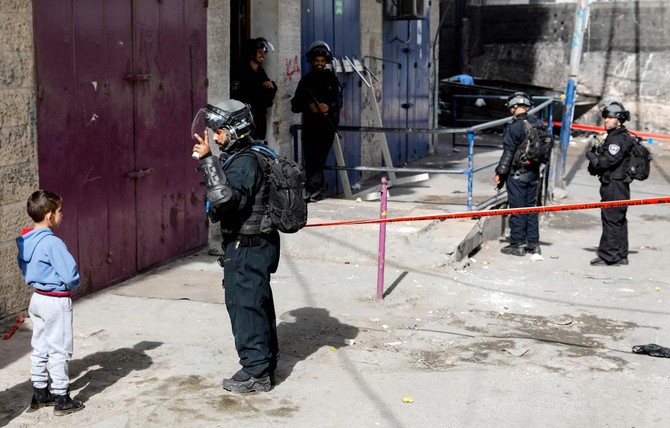
- The conflicting claims to east Jerusalem lie at the heart of the Israeli-Palestinian conflict
- A year ago, Trump upended decades of American policy and recognized Jerusalem as Israel’s capital
rael to abolish free trade deal with Turkiye in retaliation

- Earlier this month, Turkiye said it was stopping exports to Israel during the duration of the Israel-Hamas war
IsJERUSALEM: Israeli Finance Minister Bezalel Smotrich on Thursday said Israel would abolish its free trade agreement with Turkiye and also impose a 100 percent tariff on other imports from Turkiye in retaliation for Turkish President Tayyip Erdogan’s decision to halt exports to Israel.
The plan, he said, would be submitted to the cabinet for approval.
Earlier this month, Turkiye said it was stopping exports to Israel during the duration of the Israel-Hamas war, citing “worsening humanitarian tragedy” in the Palestinian territories. But the Turkish Trade Ministry has said that companies have three months to fulfil existing orders via third countries.
“His (Erdogan’s) announcement of the stoppage of imports to Israel constitutes a declaration of an economic boycott and a serious violation of international trade agreements to which Turkiye has committed,” Smotrich said in a statement.
He noted that Israel’s actions would only last as long as Erdogan remained in power.
“If at the end of Erdogan’s term the citizens of Turkiye elect a leader who is sane and not a hater of Israel, it would be possible to return the trade route with Turkiye,” Smotrich said.
Under Smotrich’s plan, all the reduced customs rates applicable to goods imported from Turkiye to Israel according to an agreement to the free trade deal would be abolished. At the same time, a duty would be imposed on any product imported from Turkiye to Israel at a rate of 100 percent of the value of the goods in addition to the existing duty rate.
The finance, economy and foreign ministries, the statement said, would also take steps to strengthen Israel’s manufacturing while diversifying sources of import to reduce the dependency on Turkiye.
Israel’s Manufacturers’ Association called Smotrich’s plan “an appropriate response” for not allowing Erdogan to damage the economy without a response.
Measured support for end of UN mission in Iraq

UNITED NATIONS: Several members of the UN Security Council, including Russia and China, on Thursday backed Baghdad’s request for the world body’s political mission in Iraq to shut down by next year — but Washington did not immediately offer its support.
Last week, in a letter to the council, Iraqi Prime Minister Mohamed Shia Al-Sudani called for the United Nations Assistance Mission for Iraq (UNAMI), which has been operational since 2003, to end by December 31, 2025.
Iraq’s deputy UN envoy Abbas Kadhom Obaid Al-Fatlawi reiterated the request before the council on Thursday, saying: “The mission has achieved its goals.”
Russian envoy Vasily Nebenzia shared that view, saying “Iraqis are ready to take responsibility for the political future of their country.”
“The remaining problems should not become an excuse for UNAMI to stay in the country indefinitely,” he added.
Within the framework of the mission’s annual renewal, due at the end of May, the council should “propose a plan... in order to ensure its gradual drawdown and smooth transition toward an ultimate withdrawal,” noted China’s deputy UN envoy Geng Shuang.
Given that UN missions can only operate with the host nation’s consent, Britain and France also voiced support for a transition in the partnership between Iraq and the UN.
The US was more vague, with ambassador Linda Thomas-Greenfield saying UNAMI still had “important work to do,” and making no mention of Baghdad’s request.
She emphasized the mission’s key role on several important political issues, such as support for organizing elections and promoting human rights, even though Iraq has clearly asked that the mission focus more squarely on economic issues.
In an evaluation requested by the council, German diplomat Volker Perthes said in March that UNAMI, which had more than 700 staff as of late 2023, “in its present form, appears too big.”
Perthes called on the mission to “begin to transition its tasks to national institutions and the United Nations country team in a responsible, orderly and gradual manner within an agreed time frame.”
Without commenting on Baghdad’s request, mission chief Jeanine Hennis-Plasschaert painted a picture of an Iraq that “looks different to the country to which UNAMI was first deployed some 20 years ago.”
“Today we are, so to speak, witnessing an Iraq on the rise,” she said, while noting multiple challenges yet unresolved, such as corruption and armed groups operating outside state control.
But she added: “I do believe it is high time to judge the country on progress made, and to turn the page on the darker images of Iraq’s past.”
ICRC officials to meet UK Foreign Office over plan for Palestinian detainees

- David Cameron reportedly negotiated deal with Israel’s government to allow two British legal observers and Israeli judge to visit some prisoners
LONDON: Officials from the International Committee of the Red Cross will hold talks with the UK Foreign Office over concerns about British plans to visit Palestinian detainees in Israeli jails.
Foreign Secretary David Cameron has reportedly negotiated a deal with Israel’s government to allow two British legal observers and an Israeli judge to visit some prisoners being held in Israeli prisons amid reports of “inhumane treatment,” The Guardian reported on Thursday.
In an interview with the BBC at the weekend, Cameron said he had spoken to Israeli Prime Minister Benjamin Netanyahu about the issue.
“It’s not all bleak ... I said it (the lack of access to detainees) was not good enough, that we needed to have a proper independent system for inspecting and regulating, and the Israelis have announced they are now doing that,” he said.
Netanyahu’s government has blocked ICRC staff from having any access to Palestinian detainees since the Hamas-led attack on Oct. 7. It has said the block will remain until Hamas allows access to Israeli hostages taken during the attack.
Critics say this stance could constitute a breach of the Geneva Conventions, with the ICRC having made repeated requests to both sides in the conflict to allow access to all those detained, as set out in the conventions.
Observers have also raised concerns that the UK plan will “weaken the rule of law” and could set a “dangerous precedent” for how detainees are treated in other conflict zones, The Guardian report added.
The ICRC’s director for the Middle East region, Fabrizio Carboni, is in London to hold talks with Foreign Office officials.
In a statement to The Guardian, the aid organization said Palestinian detainees must be treated as protected persons with access to the ICRC, as proscribed under the Geneva rules.
The statement added: “We have seen the reports of a government of Israel decision to allow observers to visit some places of detention. The ICRC remains hopeful that suitable steps are taken that could protect the health and welfare of detainees, which remains paramount. We reiterate our readiness to resume our mandated detention activities.”
Arab News columnist and director of the Council for Arab-British Understanding, Chris Doyle, said the Foreign Office plan risked establishing a system that bypassed the ICRC and internationally accepted regulations.
“There is no transparency about Cameron’s alternative … I very much doubt that two Foreign Office-appointed lawyers in the company of a judge from the occupying power are going to have the expertise of the ICRC, but will instead be taken around sanitised prisons,” he said.
“What has happened to the thousands of Palestinians taken from Gaza to Israel is a huge issue. (Neither) we nor their families know where they are, whether they are combatants or children, or why in some cases they are being stripped to their underpants. We have heard nothing from the UK government about this,” he added.
During a week-long truce between Hamas and Israeli forces in November, the ICRC played an active role in facilitating the swap of 105 Israeli hostages held by Hamas and 240 Palestinian prisoners from Israeli jails.
Residents cower as fighting picks up in Sudan’s Al-Fashir

CAIRO/DUBAI: Residents are fleeing missile fire and sheltering without food and water amid escalating fighting in the Sudanese city of Al-Fashir, witnesses and aid workers said, adding to fears of an all-out battle.
The city is the Sudanese army’s last stronghold in the western Darfur region. Its capture would be a major boost for the rival Rapid Support Forces (RSF) as regional and international powers try to push the sides to negotiate an end to a 13-month war.
Locals and aid workers fear the clashes could also lead to a new round of bloodletting after ethnically-driven violence blamed on the RSF and its allies elsewhere in Darfur last year.
Many of Al-Fashir’s 1.6 million residents arrived during the violence between Arabs and non-Arabs that killed hundreds of thousands of people in the early-2000s. The RSF’s origins lie in the Arab janjaweed militias accused of ethnic cleansing and genocide then.
In recent weeks the RSF has almost surrounded Al-Fashir, capital of North Darfur state, while soldiers from the army and allied non-Arab armed groups fill the city.
In a sign of mounting ethnic tensions, Mini Minnawi, head of one of the groups, said on X he had made a wide call for fighters to come and defend Al-Fashir, in response to what he said was a similar call by the RSF.
Al-Fashir residents report snipers, stray missiles and army air strikes causing fires in the east and north of the city. Many civilians have taken up arms.
“The situation in the city has been difficult the past few days. Missiles from both sides are falling inside neighborhoods and homes, and getting to hospitals is dangerous,” said 38-year-old resident Hussein Adam.
Medical aid agency MSF said on Thursday that the city’s South Hospital had seen 489 casualties since May 10, including 64 deaths, though it said the real toll was far higher.
Another hospital it supports, which saw 27 people killed last weekend, was forced to shut down after an army air strike 50 meters away, MSF said.
The RSF and army blame each other for the violence.
On Wednesday, the United States imposed sanctions on two top RSF commanders, including the force’s head of operations, for the attacks on Al-Fashir.
“We are prepared to take further action against those who actively escalate this war – including any offensive actions on El Fasher – create barriers to humanitarian access, or commit atrocities,” US ambassador to the United Nations Linda Thomas-Greenfield posted on X.
Experts have raised warnings of impending famine in the displacement camps that dot Al-Fashir. The city also suffers from water shortages, network outages, and high prices.
In one of those camps, Abu Shouk in the north of the city, nine people were killed by stray missiles, camp leaders said on Sunday.
Residents say displaced people from eastern neighborhoods are sheltering under trees and in open squares.
“Most families have moved west, women and children with nothing to eat or drink,” said resident Mohamed Jamal, a volunteer with the local emergency response room.
The army has so far insisted that international aid delivered via Chad for other parts of Darfur pass through Al-Fashir, something that the escalating violence prevents.
Carl Skau, Chief Operating Officer of the World Food Programme, said the agency had trucks ready in the Chadian border town of Tina, but they needed to be able to move soon.
“The window is closing, the rains are coming and we need action in the next couple of weeks,” he told Reuters after a trip to Port Sudan where he tried to negotiate with the army for better access this week.
The UN’s World Food Programme expects more people are being driven to the brink of starvation in other parts of Sudan worst affected by the war including the capital Khartoum, El Gezira state and the Kordofan regions.
“We really need to step up a concerted effort to avoid an even worse catastrophe,” Skau said.
US military says aid pier anchored to Gaza beach

- The US Central Command said the pier was “successfully affixed to the beach in Gaza” with around 500 tons of aid expected to enter the Palestinian territory in the coming days
- “It’s a pretty substantial amount, and it’s spread out over multiple ships right now,” Vice Admiral Brad Cooper, deputy CENTCOM commander, told reporters
JERUSALEM: US troops on Thursday anchored a long-awaited temporary pier aimed at ramping up emergency aid to a beach in the war-ravaged Gaza Strip, the US military and Israel said.
The US Central Command said the pier was “successfully affixed to the beach in Gaza” with around 500 tons of aid expected to enter the Palestinian territory in the coming days.
“It’s a pretty substantial amount, and it’s spread out over multiple ships right now,” Vice Admiral Brad Cooper, deputy CENTCOM commander, told reporters in Washington.
Israel’s military also said in a statement that the connection was “successfully completed.”
But Farhan Haq, a spokesman for UN Secretary-General Antonio Guterres, said negotiations remained ongoing on distribution of the aid — particularly on the safety of workers.
“We are finalizing our operational plans to make sure that we’re ready to handle it once the floating dock is properly functioning, while ensuring the safety of our staff,” he said.
The Gaza war has been devastating for aid workers. The UN agency for Palestinian refugees, UNRWA, which Israel accuses of bias, has alone lost 188 Gaza staff, according to UN figures.
Asked about the concerns, State Department spokesman Vedant Patel said the United States was working with the United Nations on practicalities but added: “From our point of view, we believe that this is ready to go and for aid to start flowing as soon as possible.”
US President Joe Biden announced the emergency pier in March to address the humanitarian crisis in Gaza, where the United Nations has warned of famine with virtually the entire population of 2.4 million displaced by the Israeli military action in response to the October 7 Hamas attack.
Built at a cost of at least $320 million, the project is extraordinary in that such massive humanitarian efforts by the United States are usually in response to actions by hostile countries, not a US ally.
The humanitarian assistance is being screened in Cyprus and loaded by truck. Once on land, it will “move quickly,” being offloaded from the coast into Gaza within hours, Cooper said, adding that “thousands of tons of aid are in the pipeline.”
He said that around 1,000 US soldiers and sailors were involved in the operation but that they would not take part in delivery, which will be led by the UN.
The war began after Hamas’s October 7 attack on southern Israel, which resulted in the deaths of more than 1,170 people, mostly civilians, according to an AFP tally of Israeli official figures.
Israel’s military retaliation has killed at least 35,272 people, also mostly civilians, according to the health ministry in the Hamas-run Gaza Strip.
The UN has argued that opening up land crossing points and allowing more trucks convoys into Gaza is the only way to stem the spiralling humanitarian crisis.
But the primary crossing into Gaza, on the territory’s border with Egypt, has been closed for days.
Israeli troops took over the Palestinian side of the crossing last week as the military threatened a wider assault on the southern city, defying warnings from the United States and others over the fate of some 1.4 million civilians who had been sheltering there.
“Of course we’re thankful to the US for all the work they’ve done in creating the floating dock. However, getting aid to people in need into and across Gaza cannot and should not depend on a floating dock far from where needs are most acute,” Haq said.
Cyprus, the Mediterranean island nation that is the departure point for aid on the planned maritime corridor, said US ship James A. Loux left Wednesday, carrying relief supplies and technical equipment.
Government spokesman Konstantinos Letymbiotis said that “new departures are expected, transporting humanitarian aid including food items, medical supplies, hygiene and temporary shelter.”
Britain, meanwhile, said its initial contribution of nearly 100 tons of “shelter coverage kits” figured in the first shipment.
The pier will begin with facilitating the delivery of around 90 truckloads of international aid into Gaza each day, before volumes are scaled up to 150 truckloads daily, a British statement said.



